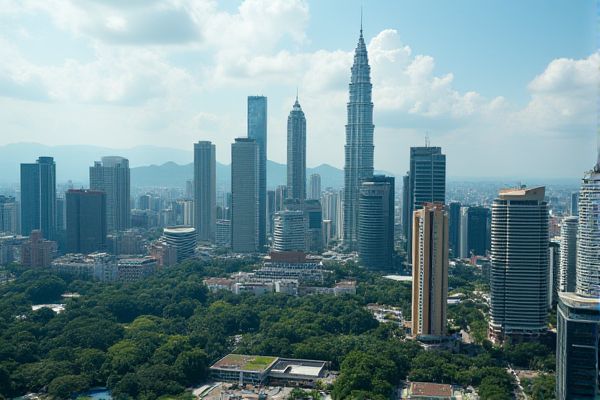
Why moving to Malaysia: Affordable cost of living. Diverse cultural experiences. Comprehensive healthcare system. Tropical climate. Reliable public transportation. Welcoming local communities. Rich culinary scene. Strong education system. Growing job market. Stunning natural landscapes.
Affordable cost of living
Moving to Malaysia offers an affordable cost of living, with a single person needing around $1,014 per month and a couple requiring $1,500 to live comfortably, making it significantly cheaper than many Western countries and other Asian cities like Singapore and Hong Kong. Housing, utilities, food, and transportation costs are also notably lower, with Kuala Lumpur being 42.72% less expensive than the US and public transportation passes costing between $27-$30 per month. For more insights on the most economical locations, visit The Cheapest Places to Live in Malaysia for a detailed breakdown of costs and lifestyle options.
Diverse cultural experiences
Moving to Malaysia offers a rich and diverse cultural experience, with a blend of Malay, Chinese, Indian, and indigenous cultures, celebrated through various multicultural festivals, traditional arts and crafts, and a vibrant mix of cuisines and cultural events. For more information about this fascinating destination, you can visit the AFS-USA website which provides insights and helpful resources for anyone considering exploring or moving to this vibrant country.
Comprehensive healthcare system
Malaysia offers a comprehensive healthcare system with a two-tier structure, comprising a government-run public universal healthcare system and a private healthcare sector, providing excellent and affordable healthcare services. This includes preventive care packages and specialized treatments, making it an attractive option for those considering a move. For more details on the healthcare systems, visit the International Insurance website for insights. Whether you're seeking routine check-ups or advanced medical care, Malaysia's healthcare options are designed to cater to a diverse range of needs.
Tropical climate
Malaysia has a tropical climate characterized by hot, humid weather year-round, with steady temperatures ranging from 73°F to 91°F in the lowlands and cooler temperatures in the highlands. This climate is influenced by two monsoon seasons that bring varying levels of rainfall throughout the year. For more detailed information on how these monsoon seasons affect local weather patterns, you can visit the website for Malaysia Weather. This resource provides insights into the climatic variations across different regions in Malaysia, helping travelers plan their visits accordingly.
Reliable public transportation
Malaysia, particularly Kuala Lumpur, offers a reliable and extensive public transportation network, including the MRT, LRT, Monorail, KTM Komuter, BRT, and ERL, which provide efficient and accessible ways to navigate the city, despite some challenges with bus reliability and connectivity. For a comprehensive guide to this network, the Kuala Lumpur MRT Map is an invaluable resource, helping both locals and tourists to efficiently plan their journeys throughout the bustling metropolis.
Welcoming local communities
Malaysia is attractive due to its welcoming local communities, where people of different ethnicities have lived together in harmony for hundreds of years, often coming together to support each other and improve their communities. This collective spirit fosters a caring and inclusive society, empowering communities to gradually raise Malaysia's quality of life from the bottom up, as highlighted in the article on Aliran.
Rich culinary scene
Moving to Malaysia offers a rich culinary scene that is a vibrant blend of Malay, Chinese, Indian, and indigenous influences, featuring robust flavors, aromatic spices, and iconic dishes like roti canai, char kway teow, and nasi lemak. Penang stands out as a culinary capital with its bold and diverse street food culture. For an insightful exploration of Malaysia's gastronomic landscape, Asia King Travel provides a comprehensive overview through their detailed blog, capturing the essence of this culinary journey.
Strong education system
While Malaysia's education system has some strengths, such as free education up to post-secondary level, modern facilities, and dual-language programs, it also faces significant challenges. These challenges include an exam-oriented approach that prioritizes memorization over critical thinking and leadership skills, and a lack of autonomy in schools which hampers quality learning. For more in-depth analysis, visit the Malaysian Education Overview on Wise's official blog.
Growing job market
Malaysia's job market is expected to remain strong throughout 2024, driven by ongoing economic expansion, increased labour demand, and a growing labour force, with the number of employed persons rising and the unemployment rate steady at 3.3%. Additionally, sectors such as retail, engineering, construction, and real estate are showing significant year-on-year growth, indicating a robust and diverse economic recovery. For more insights into this positive trend, The Edge Malaysia highlights these economic developments, illustrating a promising future for the country's workforce.
Stunning natural landscapes
Malaysia offers a diverse range of stunning natural landscapes, including ancient rainforests like Taman Negara, unique limestone formations in Mulu National Park, the highest peak in Southeast Asia at Kinabalu Park, and the geologically significant Langkawi Geopark, making it a paradise for nature lovers. These areas are home to rare wildlife, such as orangutans and proboscis monkeys, and feature breathtaking attractions like the canopy walkway in Taman Negara and the Sky Bridge in Langkawi Geopark.
